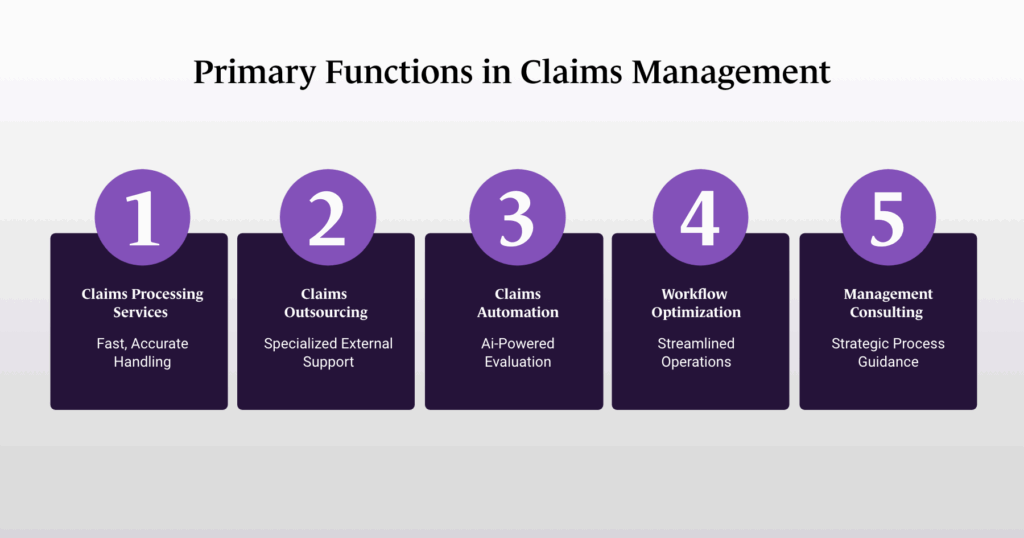Insurance Claims Management Services streamline claims intake, processing, and resolution through automation and outsourcing.
Insurance claims management services encompass a range of services designed to streamline the claims process from intake to resolution. These include claims processing services, claims outsourcing, and claims management consulting, aimed at reducing costs, enhancing accuracy, and improving the customer experience. Leveraging AI-powered tools and intelligent automation, these services now enable faster claim adjudication, predictive risk assessment, and more scalable operations, helping insurers handle complex workflows with greater efficiency.
Detailed Definition & Explanation
Insurance claims management services cover the complete lifecycle of a claim, from the initial notification to final settlement. While these services typically involve claims management consulting and digital claims management systems, AI is now transforming the way claims are assessed, processed, and settled.
Modern insurers are increasingly leveraging AI claims management to assess claims automatically, detect fraud, and even recommend settlements based on historical data and predictive patterns. The integration of AI into claims workflows enhances decision-making speed and accuracy while allowing staff to focus on complex or high-value claims.
Claims outsourcing continues to play a role, but AI integration allows third-party providers to deliver faster, more accurate results while freeing internal teams to focus on complex cases. At the same time, insurance claims workflow optimization leverages AI-powered tools for intelligent document management, automated claims routing, and continuous performance monitoring, ensuring each stage of the process is more efficient, scalable, and precise.
Types of Insurance Claims Management Services:
1) Claims Processing Services
AI-enhanced workflows streamline intake, assessment, and approvals, enabling faster, more accurate claims handling.
2) Claims Outsourcing
Third-party providers use AI-supported systems to manage claims efficiently, reducing operational costs and improving service quality.
3) Claims Automation
AI-driven systems evaluate claims, detect anomalies or fraud, and generate settlement recommendations with minimal human intervention.
4) Claims Workflow Optimization
AI tools automate repetitive tasks, standardize processes, and continuously refine the claims lifecycle to boost operational speed and accuracy.
5) Claims Management Consulting
Consultants advise insurers on leveraging AI and automation strategies to optimize claims operations, reduce risks, and enhance the customer experience.
Why It Matters
•Accelerates Claims Processing and Reduces Costs
By automating repetitive tasks and integrating claims processing systems, insurers can significantly reduce manual effort and cut operational costs. AI claims management enhances this further by automatically handling initial claim assessments and triaging claims to the right teams, freeing up human agents for higher-value tasks.
•Improves Customer Experience
Faster, more accurate claims processing improves customer satisfaction by reducing claim resolution times. Digital claims management platforms, augmented with AI, provide real-time updates, predictive timelines, and personalized communication, ensuring policyholders experience transparency and efficiency throughout the claims process.
•Enhances Fraud Detection and Risk Mitigation
AI-driven analytics can detect unusual patterns, flag suspicious claims, and predict potential fraud before payouts occur. Integrating these AI capabilities within claims operations strengthens risk controls and protects both the insurer and its customers.
•Supports Scalable Claims Operations for Growing Insurers
As insurers expand into new markets or product lines, claims outsourcing and workflow optimization combined with AI allow claims teams to scale without sacrificing quality. AI ensures operational consistency, maintains quality standards, and dynamically adapts processes to handle increased claim volumes without bottlenecks.

Real-World Examples
The adoption of insurance claims management services powered by AI is helping insurers reduce costs, accelerate claims processing, and improve customer experiences. Here are examples from the industry:
Sapiens International Corporation
Sapiens provides AI-enabled claims management solutions that automate claims intake, processing, and settlement. Their platform leverages machine learning to assess claims in real time, identify fraud risks, and recommend optimal claims settlements, accelerating the entire claims lifecycle while improving accuracy.
Cognizant
Cognizant’s AI-augmented claims outsourcing services help insurers streamline claims operations and enhance decision-making. By integrating workflow automation with predictive analytics, Cognizant accelerates claims intake, improves settlement accuracy, and provides actionable insights to reduce operational risk.
Xchanging
Xchanging delivers claims processing services with embedded AI capabilities that optimize routing, approval, and payment workflows. Their system analyzes historical claim data to predict processing times, identify anomalies, and reduce administrative overhead, ensuring faster and more reliable settlements.
FD Ryze
FD Ryze leverages agentic AI to transform insurance claims management end-to-end. Its platform autonomously evaluates incoming claims, identifies fraud signals, optimizes workflow allocation, and generates settlement recommendations in real time. Insurers using FD Ryze can scale claims operations, maintain high accuracy, and deliver faster, more transparent experiences for policyholders.
What Lies Ahead
AI Will Drive Full Claims Lifecycle Automation
The future of insurance claims automation will expand beyond just intake and triage. End-to-end AI systems will allow claims to be processed, evaluated, and settled with minimal human involvement, improving both speed and accuracy. Platforms like FD Ryze will continue to play a critical role by enabling intelligent agents that handle dynamic decision-making across the entire claims workflow.
Blockchain Will Enhance Claims Transparency and Security
Blockchain adoption in claims management will ensure data integrity, enhance transparency, and prevent fraud. Smart contracts will automate claims payouts once conditions are met, reducing delays and increasing trust between insurers and policyholders.
Integration of Multimodal Data Sources for Claims Resolution
Next-generation claims systems will integrate data from IoT devices, wearables, and third-party platforms. This will give insurers real-time visibility into claims events, enabling more accurate assessments and faster, evidence-backed decisions.
Personalized Claims Adjustments Through Agentic AI
Agentic AI will allow insurers to customize claims processes based on the unique needs of each claim. AI agents will recommend personalized settlement amounts, handle exceptions, and automate specific actions, reducing manual intervention and streamlining complex claims.
See how leading insurers are using automation to accelerate claims and improve accuracy. Read the case study.
Related Terms
- Insurance Claims Automation
- Claims Processing Services
- Digital Claims Platforms
- Claims Fraud Detection
- Insurance Operations Optimization
- Claims Outsourcing
- Insurance Claims Workflow Optimization
- Predictive Claims Analytics
